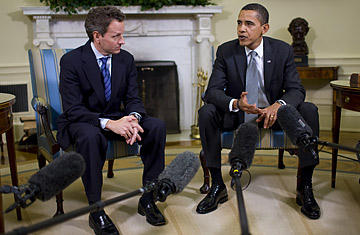
President Barack Obama meets with Treasury Secretary Timothy Geithner in the Oval Office
(3 of 4)
What about the spending provisions in the various plans? Again, there has been an Alice in Wonderland quality to much of the criticism, as if Keynes were a fraud and government spending couldn't possibly create jobs — especially spending on biomedical research or education about STDs or any other programs that sound vaguely liberal and exotic. But biomedical research jobs are real jobs. So are jobs beautifying the Mall and warning teenagers about herpes. So are jobs building and engineering rail lines for Amtrak, regardless of the company's current profitability. Granted, some spending proposals would work faster and better than others. But it's telling that House minority leader John Boehner keeps ridiculing programs to weatherize low-income homes — which would create jobs in a hurry, save poor people money in the long term and reduce energy waste that increases carbon emissions and empowers foreign thugs. It's a worthy program, and if anyone doesn't think so, now is the perfect time to have that debate. What's the argument in favor of heating and air-conditioning the outdoors?
Most of the recent spending debate has focused on waste — money for new weather satellites, antismoking programs and the like. But the austerity scolds haven't found many outrages; antismoking programs, for example, are a terrific way to hold down the long-term health costs that threaten the Treasury's long-term solvency. There ought to be even more money for mass transit, which reduces energy use, increases the competitiveness of metropolitan areas and helps working families, as well as freight rail, which has even greater environmental and economic advantages. Expanded unemployment benefits and food stamps would be excellent stimulus — and those are both desperately needed right now. Retrofitting federal buildings to use less energy would provide jobs now and reduce federal energy costs in the future. By contrast, professor Feldstein's proposal to beef up the military could dramatically increase both our future obligations for pensions and health-care costs for veterans. In general, most of the current proposals (though not all of them) aim to limit the new spending to the next two years.
Certainly, there's some junk in there. The Senate wants to toss as much as $50 billion into loan guarantees for nuclear plants, even though their costs have gone through the roof. And there's talk of further subsidizing home mortgages that are already tax-deductible, as if the Federal Government hasn't done enough to encourage homeownership (and in the process, it can be argued, help lay the foundation for the current crisis). But Obama has called for an earmark-free stimulus, so the legislation shouldn't have too many embarrassing waterslides, Mafia museums or cranberry subsidies. Instead, Congress would funnel hundreds of billions of dollars to states and various agencies.
